#i also think most of classic literature is just people praising white old men for doing the bare fucking minimum
Explore tagged Tumblr posts
Note
whats your most rancid take about anything at all i am a bitch for drama and i know you're bored in uni JSJDJSSJDKJS
leee!!! 😭😭 it‘s not that i am particularly bored in uni it‘s more that i am in fact crying and screaming and throwing up as we speak. the lecture hasn‘t started yet tho, so lemme get back to your question.
my most rancid take on anything??? damn i have been blessed with sooo many right opinions it‘s insaane, but here is the first one i can think off:
people are too obsessed with “not being cringe”. newsflash everyone. you are cringe. so fucking cringe it fucking hurts. actually want to rip my eyes out levels of cringe. about to drown myself in a bucket of stagnant water levels of cringe. but you know what??? but we’re ALL cringe. i can guarantee you there is at least like 5 things you either do or believe i think is cringe af. and there is at least 5 things i do or believe you will think is cringe af. maybe you think i am cringe while reading this, too. will it change anything at all in this big ass world? n o. actually being so obsessed with whether something is cringe or not and letting this stop you from doing it or liking it. that iS CRINGE. more cringe than anything else. so stop. take responsibility for your shit. cuz you finding stuff cringe is 100% on you and you alone. stop taking your shit out on others. people don’t have to adjust to your very specific and very subjective view on what is okay to do and what is not. especially in fandom spaces. self inserts? cringe but fUN? self shipping? cringe but who gives a fuck. writing mary sue fanfics? cringe but it won’t kill aNYONE (i do all of those things okay and it’s cringe but i won’t be embarrassed about it because cringe is merely ✨an iLLUSION✨ shiggy is my boyfriend. sanji is my husband. i made a self insert for eVERY SINGLE FANDOM i have EVER been apart of and all of them were mary sues and the earth has continued twisting and turning in the cruel and unforgiving grip of the sun’s rotation and the sun rose and set and died a slow and painful death over and over and over and the birds tweedle deed and tweedle dummed and sat together on a wire before one of them tried to fly away and the other watched them close from that wire and said he wants to as well but he was a fucking liar and-
#this turned out to be quite aggressive towards the end#that’s also cringe lmao#self shipping#self insert#(tagging it self shipping cuz my dash is full of it)#(cuz i liked oNE post and tumblr won’t leave me alone)#“based on your likes” shooting you biting you eating you#another rancid take:#i also think most of classic literature is just people praising white old men for doing the bare fucking minimum#(which is write words on paper)#ikik they‘re classic ‘for a reason‘ but let‘s be real???#a lot of their writing suucks.#so bad#like lures me to sleep kinda boring#hope ‘picture of dorian gray’ and ‘handmaid’s tale’ can change my mind#cuz i actually spENT my wELL EARNED money on those
2 notes
·
View notes
Text
FIFTY SHADES OF A COLOR*
*I have just noticed maybe Margaret Mitchell used homophony and meronymy to name the two characters with clear purpose: Scarlett and Rhett (Red) are two shades of the same color.
Since I was still a secondary school girl, I have heard a lot about “Gone with the wind” in many ways. The first adjectives appearing in my mind whenever I think about this novel are “Classic” and “Romantic”, based on the praise and description about it. I have always been curious about the film, especially when I saw the beauty of the actress playing Scarlett O’Hara.
“Gone with the wind” - an epic candidate to embodish both American Literature and Filmology, whose plot was created by Margaret Mitchell in 1936, has the setting in the American South around the time of the Civil War. Refering to its phenomenal success, it would be a mistake if we complement its plot only and skip the characters. There have been numerous critics for the two protagonists of the story, however, it does not prevent me from expressing my own thoughts on Scarlett O’Hara and Rhett Butler due to their strong impression.

Rhett Butler and Scarlett O'Hara
When the story opens, Scarlett O’Hara was a pretty sixteen-year-old girl with dark hair, green eyes and slim figure, one evidence was her 47-cm waist. Unlike the other girls, her choice of outfits challenged the traditional unwriten rules for ladies. For example, she insisted on wearing a rather skin-revealing dress before 3:00 p.m to attend a party at The Twelve Oaks. Normally, she had special care to her appearance and outfits, however, during the difficult time of Tara, she told her sister that having pretty hands – symbols of a lady – was no longer a concern in that situation. At the beginning of the story, she used to quarrel with her sister for a dress, but when Tara suffered from the war, she did not care about appearance anymore until she thought of enducing Rhett Butler for money and accepted wearing a dress made from window curtain.These details prove that on the outside, Scarlett can be a charming, dreamy, feminine and somehow spoiled lady, however, she was truly fiery and practical at core.
Having parents as different as chalk and cheese, Scarlett inheritted their both significant featues. While Ellen O’Hara was a refined French aristocrat, Genald O’Hara was a fun and free-spirited father, who stemmed from a humble background but thanks to hard-headedness and a bit of luck, he could enjoy a better life. Scarlett resembled Ellen in the way she appeared to the outsiders but on the inside, she was more like her father, especially the determination. This characteristic is the driving force for her actions during the story, from her first attempt in expressing her love with Ashley Wikes, best manifested in the War time and highly probable to continue even after the story ended on the pages.
The most exciting thing about Scarlett O’Hara is her personality. Although her aforementioned appearance and background have partially revealed who she is, it is her actions and words throughout the story that define Scarlett O’Hara. Notably, we can see the development of this character along with the chronological events. In the first part of the film, I can easily name three values that Scarlett appreciated: herself, herself and herself. She was as pretty as narcissus but she was also a narcissist, illustrated by her attitudes and actions towards other characters. Around her were often many men and boys, she flirted with them to feed her pride and make other jealous of her. Despite knowing Melanie and Ashley were going to get married, Scarlett still expressed her love for Ashley regardless of his fiance’s feelings, and even after they were husband and wife, she still pursued her desperate love and hurt others. Scarlett got married with the first two husbands without love just to revenge Ashley and got money. Even after the unfortunate husbands died, she never shed a tear for them but for her own sake and shallow guilt. When Scarlett was a nurse in Atlanta, she could not bear it because she only thought about how disgusted and terrified she was. In these details, Melanie’s kind heart and selflessness highlighted the sharp contrast between the two sisters-in-law. Scarlett’s care for herself represents to some extent American values: self-reliance and individualism. It may be terrible for people around Scarlett but definitely benefit herself and helped her achieve ambitious goals.

Melanie Hamilton

Ashley Wilkes
Another striking feature of Scarlett is her intelligence. The way she talked with boys, the way she managed through difficulties, saved Tara, run successfully a sawmill in Atlanta, etc proved her outstanding talent compared with other typical ladies at that time.
It is hard to say Scarlett is a loyal woman or not without any explanation. She was definitely faithful to her love for Ashley since teenagehood till having 3 husbands. The wrong thing here is they were not single; they all had their partners, yet still had improper behavior. Her infidelity resulted in tragedy for all four people: Ashley and Melanie, Rhett and herself.
The thing I admire Scarlett O’Hara the most is her strong determination. Once she wanted to achieve something, she would take any measures necessary and forget concepts like honor and kindness. Even at the darkest moment of war, this woman still did not give up on hope and a better future. She overcame social prejudices to enjoy life, to run a carriage, to manage a sawmill. I support her as a strong-minded woman, yet do not agree totally with her heartless methods from time to time.
On a whole, Scarlett may be a bad girl who only thought for herself but sometimes she was quite adorable and childlike, especially when she was near Rhett. For example, when they ran away from Atlanta, she told him: “I forgot to lock the door”, and afterward she cried like a baby missing home and insisting on seeing mother. She also resembled a child’s excitement when she was cared by Rhett in New Orleans.
Unlike Scarlett O’Hara, we hardly know anything about Rhett Butler based on his background and appearance. This man’s personality can only be revealed through his sayings, actions and interactions with others. Under the cover of a gentleman with signature smirk is a cunny, wise, quick-witted, decisive and brave man. Sometimes we can feel that Rhett is like a male version of Scarlett.Thanks to his wit, he could quickly took advantage of the war and became rich. Once he wanted to achieve something, he would also take any measures necessary. He was the only man that can understand her best, even better than Scarlett herself. Although he may have any woman he wanted, he still loved Scarlett years after years. Between these two is a special chemistry: they may be bad in other people’s eyes but strangely compatible with each other despite Scarlett could not realize it sometimes. However, on the whole, I think Rhett seemed to be less selfish than Scarlett. He risked his life to save Scarlett, joined the army because of honor, he cared about others’ feelings, no matter what class they came from, no matter that person is Melanie or Mammy. He also behaved more rationally, could keep calm and conscious in almost every situation, except for when it related to the two people he loved the most: his wife and daughter. That was also his weakness, we can see how heartbreaking he was when he knew Scarlett, despite his unconditional love for her, still loved Ashley, and when his beloved daughter died, he was literally insane until Melanie came. Overall, I do not think we can classify Rhett Butler as a completely good guy, but this man has some admirable characteristics which definitely deserved widespread recognition.

Mammy (on the right, in case you are confused)
All in all, the two classic characters had made a strong impression on me as well as many other audiences. Black or white, we can not classify them in one word, and that is why I love the complexity and development of these characters. A strange love story between two extraordinary people will have a happy ending or not, based on their personality, I can not give a certain anticipation, nevertheless, even without knowing the ending, we can still admire them for themselves only.
------------------------- Cảm ơn các bạn đã quan tâm. Youtube: https://youtube.com/c/beeline92 Facebook: https://www.facebook.com/xoiduamedia/ Website: http://xoidua.com
2 notes
·
View notes
Text
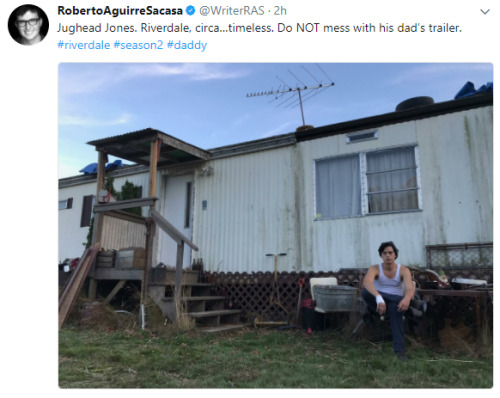
There are just so many damn things to pull out of this image, and some subsequent Googling to legitimate my initial knee-jerk reaction of "oh hello, William Faulkner" just seemed to bring into sharp relief a lot of interesting connections. These ended more as scattered remarks than as a full proper essay, but it still got long, ‘cause I don’t know any other way to be!
So: thoughts about the symbolic aesthetics of this image; class, trash, and “timelessness”; a constellation of classic literature, film, TV, and pop music connections; and ideas about Jughead Jones in S2, below the cut.
@lessoleilscouchants knows her Faulkner much better than I do, and so encapsulated brilliantly a lot of what I was going to say in her own observations about this aesthetic: “a semi-tragic narrative of class warfare, dead yellow grass, weighty history, bare feet on broken steps, useless resistance against the paths set out for them, and a general sense of doom.” I want to also add a theme from Faulkner's short story "Barn Burning": a son agonizing over whether he should remain loyal to his father in the face of that man's repeated crimes. The choice is complicated by the fact that his father's acts of destruction are clearly a form of protest against the family's place in the profoundly inequitable structure of their society. Hellllooooo FP, Jughead, and South Side Serpent feels! (Although I certainly hope that FP does not suffer Ab Snopes’ fate.)
I got to "Barn Burning" from this really great essay about the material culture of trash and waste in Faulkner's work. Jumping back to the campy elements of Riverdale, it certainly made me think about the ways in which we are all “trash” for this “trash show” - but it also made me move more broadly from the materiality of "trash" to remember that Faulkner's Snopeses are generally considered one of the most famous examples of "white trash" in American literature. (I am scare-quoting this term to be clear that I’m not just throwing it out there, but rather am bringing it up to analyze it.) Despite Jughead calling himself "a damaged loner outsider from the wrong side of the tracks" and Cheryl calling him "a hobo," I'm pretty sure that up to this point, no one on Riverdale has actually used a term that would seem to present itself very naturally: "trailer trash." (Again, not just throwing this term out there!)
This absence is interesting, especially considering the (seemingly increasing) importance of FP's trailer as a physical location where important plot points happen (*ahem*), and as a general shorthand for characterizing conflicts between FP and Jughead, the South Side and the North Side, and the issue of class within Riverdale generally.
And so now we get this beautifully composed image, which is just full of elements of entropy and decay and trash, in all the varied and loaded meanings of that term. I’m going to repost for scrolling convenience - many thanks to @musingmola for the original image of the tweet, and @jandjsalmon‘s close-ups.
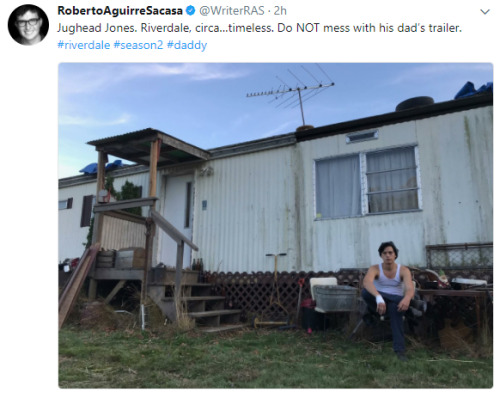
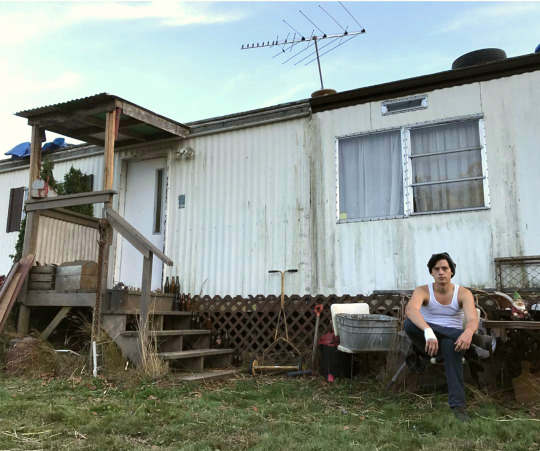
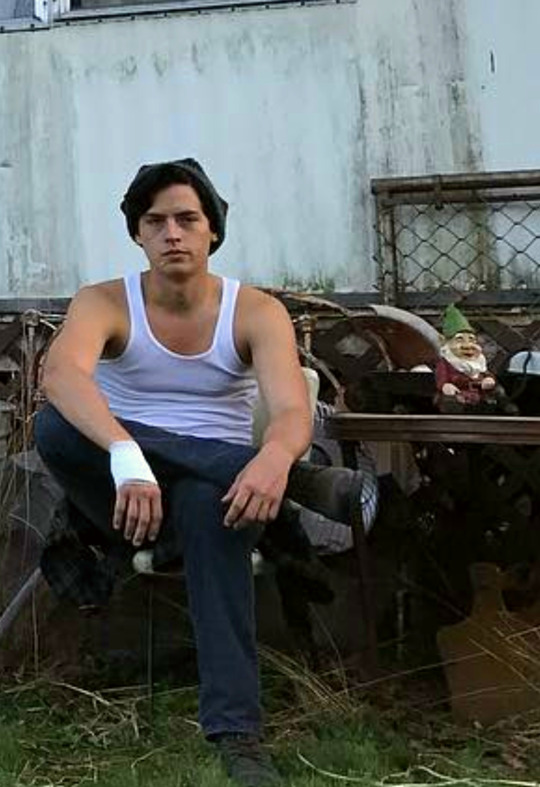
There's the trailer itself, with discoloration of the siding - the old and tilting antenna - the bars on one set of windows (but not both) - the blue tarp on the roof at top left. As we know, this is a decaying and neglected home, both literally and metaphorically.
We have the selection of objects outside the trailer, which seem to have just accumulated there over time - there's that breakdown of order, the rejection of social rules about keeping a neat house. The objects SEEM random - an old hand mower, a washtub, the various scrap metal parts behind Jughead, the garden gnome - and there, too, we have that postmodern fascination with evocative fragmentation, with the potential in trash and pieces.
A quick note on "trailer trash," considered now as an identity category rather than as the actual physical objects surrounding the trailer. Although obviously non-white people can and do live in trailers, "trailer trash" is pretty much interchangeable with "white trash." And "white trash" is first and foremost a distancing term that lays down boundaries to try to contain problematic whiteness - whiteness that is poor, disorderly, violent, ungovernable; whiteness that threatens to disrupt and undermine the typical racialized social hierarchies. (This is not my insight - people like Annalee Newitz and John Hartigan, Jr., and most recently Nancy Isenberg have written much more thoroughly about the history, connotations and function of the term.)
Let’s go for the loudest detail first: that white tank top is such a loaded symbol in this context, you guys. It's SO loaded. We all know what the awful colloquial term for a shirt like that is. I don't totally buy the full explanation for the origins of the term here, but the observation that classic films (like Marlon Brando in A Streetcar Named Desire) cemented its symbolic association with violent, unstable, and I would add a sexualized working-class masculinity, is apt.
(So: RAS commenting on the "timelessness" of this shot? Check. Possibly Jughead reaching into his own store of classic film symbology? Also check. I can’t find the promo image of Jughead in that weird jacket right now, but I want to point out that this isn’t the first Brando aesthetic nod we've gotten for S2. I STILL need to know who the fuck Stefano is!)
That bandaged hand is straight-up evidence of previous violence; that wary look and the tense posture implies the promise of more to come, as needed. I am NOT, of course, suggesting the connotations of the shirt as an explanation for that injured hand in this case! Just observing on the general aura of trouble.
Furthermore. This kid normally lives in layers of clothing, and now we've got him down to that ever-so-symbolic sleeveless top, sitting resignedly outside his family home? Way to underscore the idea that the circumstances of Season 2 are going to strip down all those layers, and make Jughead grapple with who he is, where he comes from, where his loyalties lie, what he's afraid of being underneath it all, etc.
Jughead's fascination with writing and film, particularly auteur film - I'm now thinking about that as a layer of cultural armor against being called "white trash." Like, I don't think it's feigned or anything - but it certainly has the happy side-effect of being a way to forestall those accusations of a lack of culture. He's not TRASH; he's a WEIRDO. He's on the fringes, but that gives him the power of insight that you lack. (I should also point out here that @foresightfromforsythe has been doing this Jughead-as-trash-king analysis piece by piece for months now. Whoever runs that account is brilliant.)
The idea of concealing or revealing your fears about who you are and what you've inherited from your parents, got me thinking about another one of my beloved TV shows, in which the main character creates a new identity that allows him to escape the childhood wounds inflicted by poverty, a troubled, alcoholic father/son relationship, and repeated maternal rejection. And I realized that nearly any time that Don Draper is getting touch with his inner Dick Whitman, white sleeveless undershirts come into play in EXACTLY the same ways I've been talking about above.
Dick Whitman and his “Uncle” Mack:
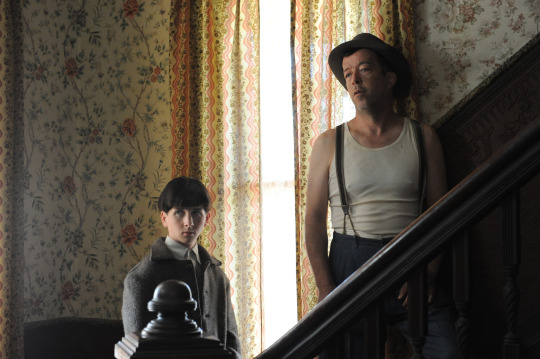
Dick Whitman in the moments leading up to the creation of Don Draper:

And then I got lost in considering the fact that Don Draper's father's name is ACTUALLY ARCHIE; the whole Betty connection; and that in one memorable episode, Don Draper hallucinates about sleeping with a character played by Madchen Amick and then strangling her to death. I don't think that any of that is actually all that useful in reading this image or the direction of Season 2 - I'm not arguing that Jughead is Don Draper - but it sure was fun to think about.
Of course, the connection to Mad Men also gets us to some of the criticism leveled at that show - that it was more in love with its own aesthetic than with exploring the historical issues of the period, and particularly the racial tensions of the 1960s. I'm not going to rehash that debate here, but I *will* observe that Riverdale also loves its aesthetic and has also received some criticism about needing to make its non-white characters more fully realized. There's always the possibility that Season 2 is going to do the "Civil War" storyline in a way that centers mood and aesthetic, which, like, clearly I HOPE IT DOES, but there are ways to do that with more and less heft, you know? I know I'm going to love it one way or the other - for me, it's honestly enough for this show to be Teen Peaks/Maple Syrup Murder Hour, without necessarily saying that it must also be Let Us Now Praise Famous Men. But it's going to be interesting to see just how seriously the showrunners decide to engage with this theme.
Because of course, a predilection for surface-level engagement is another interpretation of the image. For everything that I've just said about trailer trash above, God knows that there is also a certain type of undeniable (and undeniably comfortable) cultural capital in the melancholy aesthetic of rusty metal and decaying trailers and lithe young white men showing off their defined biceps in sleeveless T-shirts. (CS himself also seems to love to play with and remix this aesthetic in his photography and personal aesthetic.) It's the minor-key version of Americana. We might call it, as Everlast does, "White Trash Beautiful."
(Please note: this is the potential departure point for a whole other Current Events meta on the cultural politics of nostalgia and the romanticization of an idealized version of the white working class, which - in short: please make smart and savvy choices, RAS!)
Anyway, now that I've gone and broken the seal on musical connections here, it's time to say that I probably could have just copy/pasted the lyrics to Modest Mouse's "Trailer Trash" here and been done with it. (Here's a great little essay on this song at Pop Matters.)
The ephemeral "trash" of plastic forks and paper plates; the "short love and a long divorce"; calling the people you love "fakes" when they try to compare their trauma with yours, and then realizing that you need them anyway and apologizing as best you can: is there anything more 1x10 Jughead than this? It'll be interesting to see whether it turns out to be S2 Jughead as well.
#riverdale#riverdale season 2#jughead jones#fp jones#william faulkner#mad men#don draper#dick whitman#class in popular culture#the importance of costuming#high culture and low culture#overanalyzing pop culture#overanalyzing everything#one person's trash is another person's treasure#sorry for that pun but come on#riverdale meta#my words#if you made it through this whole thing I love you to bits!
152 notes
·
View notes